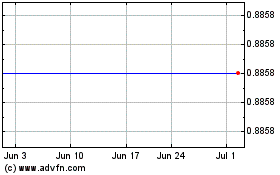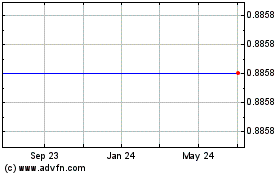Credit Suisse Posts Third-Straight Loss but Says Strategy Is Working--Update
February 14 2018 - 8:02AM
Dow Jones News
By Brian Blackstone
ZURICH -- Credit Suisse Group AG posted its third-straight
annual loss Wednesday as the U.S. corporate tax overhaul forced the
Swiss banking giant to write down over $2 billion in deferred-tax
assets and erased what would have been a healthy return to
profit.
The bank was upbeat on its outlook, with Chief Executive Tidjane
Thiam saying that "our strategy is working" as it enters the final
year of a three-year restructuring plan. Its pretax income for
2017, excluding that one-time hit, jumped from the previous year on
strong revenue growth in its wealth management arm.
Credit Suisse shares rose by as much as 4% in early European
trading and were up nearly 3% midday.
But the bank reported a loss of 2.1 billion Swiss francs ($2.3
billion) in the fourth quarter and 983 million Swiss francs for the
full year due to the changes to the U.S. tax system. The losses
were less than analysts had expected. Excluding the tax-related
charges -- mostly from the signing of the U.S. tax law -- Credit
Suisse would have earned about 1.8 billion francs in profit last
year, Mr. Thiam said.
Credit Suisse disclosed in December that it expected a $2.3
billion hit from the value of its deferred tax assets -- past
credits and deductions that companies can use to offset future tax
payments. The new U.S. corporate tax rate -- lowered to 21% from
35% -- makes these assets less valuable.
Credit Suisse said it expects "positive business uplift" from
the tax reform.
Still, the accounting adjustment drove the bank to its
third-straight year of red ink. Because the law was signed in 2017,
it had to be accounted for in that year's earnings, which has
affected earnings at other big banks too. Last month, UBS Group AG
wrote down $2.9 billion in these assets.
Credit Suisse's 2015 loss was prompted by impairment charges as
it scaled back its investment banking business. In 2016, the bank
lost 2.7 billion Swiss francs after reaching a settlement worth
about $5.3 billion with the U.S. Justice Department related to
mortgage securities sold before the financial crisis.
After a rocky 2015 and 2016, 2017 was a year of relative
tranquility. The bank's strategic shift toward wealth management --
while maintaining a streamlined investment banking unit --
proceeded without big disruptions and it didn't have costly
litigation issues. Its share price, which briefly fell below 10
francs per share in mid-2016, rose by 20% in 2017.
Mr. Thiam rejected the idea that his bonuses and those of other
top executives would be affected by the accounting-driven loss.
"You're asking me because Mr. Trump decided to sign the U.S. tax
cut and jobs act on Dec. 22, and not Jan. 1, which means that the
bonuses should be cut? Because if he would have signed it Jan. 1 we
would have had a 1.8 billion [franc] profit," he said at the press
conference. "So I don't think the board is going to take that
view."
Credit Suisse said that its outlook for the global economy
"remains positive," though it alluded to the recent period of
turbulence in the financial markets.
"In the first six weeks of 2018, we have seen a significant
pickup in market volatility, which on the one hand had a positive
impact on our secondary activities, and on the other hand,
negatively impacted our primary calendar as clients wait for calmer
markets in order to transact, " it said.
Last week, the bank said it was closing a fund it had created in
2010 that allowed investors to bet on a period of tranquility in
financial markets. The fund, known as XIV, plunged in value early
last week, though Credit Suisse said it didn't suffer trading
losses.
Mr. Thiam said the fund only generated about 10 million Swiss
francs a year in revenues. "Any notion that this is material to us
is fanciful," he said. Mr. Thiam read from the fund's prospectus
that listed the risks and caveats associated with the product,
adding "it's a trading tool."
Estimated net revenues in its global markets unit were up more
than 10% in the first six weeks of 2018 versus the same period one
year earlier, and over 15% in Asia.
Credit Suisse also said it has responded to requests from
regulators including the Justice Department and Securities and
Exchange Commission over its hiring practices in Asia, and whether
it hired referrals from government agencies in exchange for
business and regulatory approvals.
The bank said it is cooperating with authorities.
--Pietro Lombardi contributed to this article.
Write to Brian Blackstone at brian.blackstone@wsj.com
(END) Dow Jones Newswires
February 14, 2018 07:47 ET (12:47 GMT)
Copyright (c) 2018 Dow Jones & Company, Inc.
Credit Suisse (NYSE:CS)
Historical Stock Chart
From Mar 2024 to Apr 2024

Credit Suisse (NYSE:CS)
Historical Stock Chart
From Apr 2023 to Apr 2024
